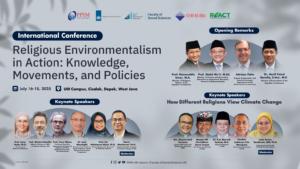Over 1 million people or about 15% of the world’s population are people living with some form of disability. The number is dramatically increasing. This is due to demographic trends and chronic diseases spreading rapidly (WHO, 2011). Although the number is large and increasing, people from this group often face diverse social, economic, and cultural exclusion, they are also restricted from complete, effective, and equal participation in society (UNFPA, 2012; WHO, 2011).
The Center for Islamic Studies at the Universitas Nasional (PPI-Unas) in collaboration with the International Center for Diarrheal Disease Research, Bangladesh (icddr,b) and supported by PENDA (Program for Evidence to Inform Disability Action) and UKAid conducted an evaluation study of the Hygiene Behavior Change Coalition Program (HBCC) in Indonesia. This study aims to look at the inclusiveness and effectiveness of the implementation of the HBCC Program as well as to understand the situation experienced by the disabled and the elderly during the Covid-19 pandemic. (Downloads:HBCC Policy Brieft English Lowress)






